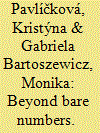| Srl | Item |
| 1 |
ID:
178658


|
|
|
|
|
| Summary/Abstract |
This paper closely scrutinises NATO engagement, particularly the The Eastern Flank countries in the Middle East. Our main argument is that the quantitative approach to free riding is useful only when it comes to black-and-white policy choices and either-or policy decisions. Simultaneously, it fails when we are faced with more complex situations in which evaluations go beyond the very simple numerical markers, such as the 2% threshold of defence spending. By bringing together a unique regional focus (the European East and the Middle East), theoretical dilemmas (free-riding) and policy issues (NATO's multilateral framework of co-operation understood in terms of strategic interests and practical engagement), we are able to show that Romania is a subtle free rider, which cannot be verified by merely looking at numbers alone, but can be ascertained by a careful qualitative analysis which reveals a discrepancy between the country's strategic interests and its level of engagement.
|
|
|
|
|
|
|
|
|
|
|
|
|
|
|
|
| 2 |
ID:
173167


|
|
|
|
|
| Summary/Abstract |
The recent rise in the defence budgets among the NATO members reawakens the free-riding dilemma. This article provides an analysis of the defence spending of two new member states, the Czech Republic and Lithuania. Based on the free-riding theory, we explain why some of the new NATO members decide to increase their defence budgets (Lithuania), and others do not (Czech Republic). In contrast to the majority of works which focus either on the US as the biggest spender or on the “old” members of the Alliance, we explain under what circumstances some of the small European states who became new NATO members started to increase their defence budgets even though they do not have to, and the literature suggests that free-riding is easier. In the process, we identify three crucial factors that influence the decision-making process in this regard: the level of threat perception, economic situation, and the US pressure.
|
|
|
|
|
|
|
|
|
|
|
|
|
|
|
|